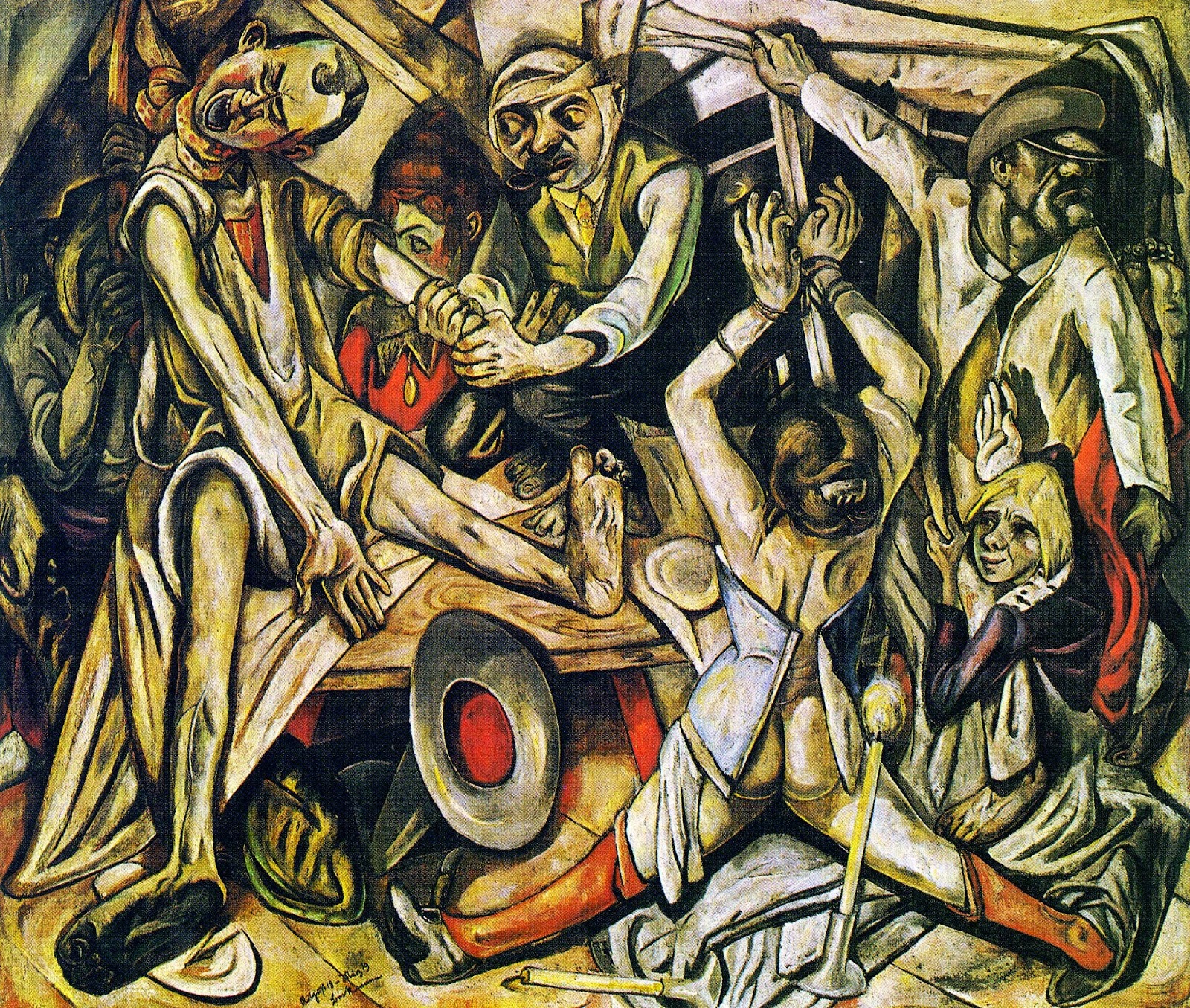The First World War, British and German Soldiers, Bernafay Woods, 1916
Otto Dix, Card Playing War Cripples, New Objectivity
George Grosz, Funeral of Oskar Panizza, New Objectivity
Käthe Kollwitz, "Outbreak," from The Peasant War, etching, New Objectivity
Max Beckmann, The Night, New Objectivity
Hugo Ball in costume about to recite one of his poems at the Cabaret Voltaire in Zurich, Dada
Sophie Täuber, puppets, Zurich Dada
Hans Arp, Random Collage, Zurich Dada
Raoul Hausmann, The Spirit of the Age, collage construction, Berlin Dada
Hannah Höch, The Flirt, photocollage, Berlin Dada
John Heartfield, "And Yet, It Moves," photomontage, Berlin Dada
Kurt Schwitters, Construction for Noble Ladies, painting and collage
Kurt Schwitters, Merzbau, (destroyed)
Marcel Duchamp, Nude Descending a Staircase
Marcel Duchamp, Fountain
Marcel Duchamp, The Large Glass (The Bride Stripped Bare By Her Bachelors, Even)
THE FIRST WORLD WAR
New Objectivity
--Otto Dix
--George Grosz
--Käthe Kollwitz
--Max Beckmann
DADA
Zurich
--Cabaret Voltaire
--Automatic Drawing
Berlin
--photo-collage
--photo-montage
Marcel Duchamp
--readymade
--anti-art
The First World War: The Menin Gate, Ypres Belgium
The Menin Gate is a war memorial whose walls are covered with the names of British, Canadian, Australian, and New Zealander soldiers who perished in fighting around Ypres, and whose bodies were never recovered.
Every evening buglers from the Ypres fire department play The Last Post, and have done so since 1918, except for the years of German occupation during World War II.
The First World War is a largely forgotten conflict for most Americans, but the memory of that war still touches open wounds for a lot of Europeans, even a century later, as you can see in the large attendance at this ceremony and every ceremony at the Menin Gate.
Dada on Film
Ghosts Before Breakfast,
A film by Hans Richter, 1928. In this 6 minute film, Richter appears in the movie along with two composers, Darius Milhaud, and Paul Hindemith who wrote the music for the now destroyed soundtrack. Ordinary objects seem to come to life and have a will of their own in this plotless movie that uses stop action animation in a very original way.
Anemic Cinema
Anemic Cinema, 1926. Duchamp made a series of spirals and filmed them while turning on a phonograph turntable. He also added a series of spiraling phrases that are intended to be puns.
Here are those phrases untranslated:
"Bains de gros thé pour grains de beauté sans trop de bengué." (BenGay was invented in France by Dr. Jules Bengué)
"L'enfant qui tète est un souffleur de chair chaude et n'aime pas le chou-fleur de serre-chaude."
"Si je te donne un sou, me donneras-tu une paire de ciseaux?"
"On demande des moustiques domestiques (demi-stock) pour la cure d'azote sur la côte d'azur."
"Inceste ou passion de famille, à coups trop tirés."
"Esquivons les ecchymoses des Esquimaux aux mots exquis."
"Avez-vous déjà mis la moëlle de l'épée dans le poêle de l'aimée?"
"Parmi nos articles de quincaillerie par essence, nous recommandons le robinet qui s'arrête de couler quand on ne l'écoute pas."
"L'aspirant habite Javel et moi j'avais l'habite en spirale."
















